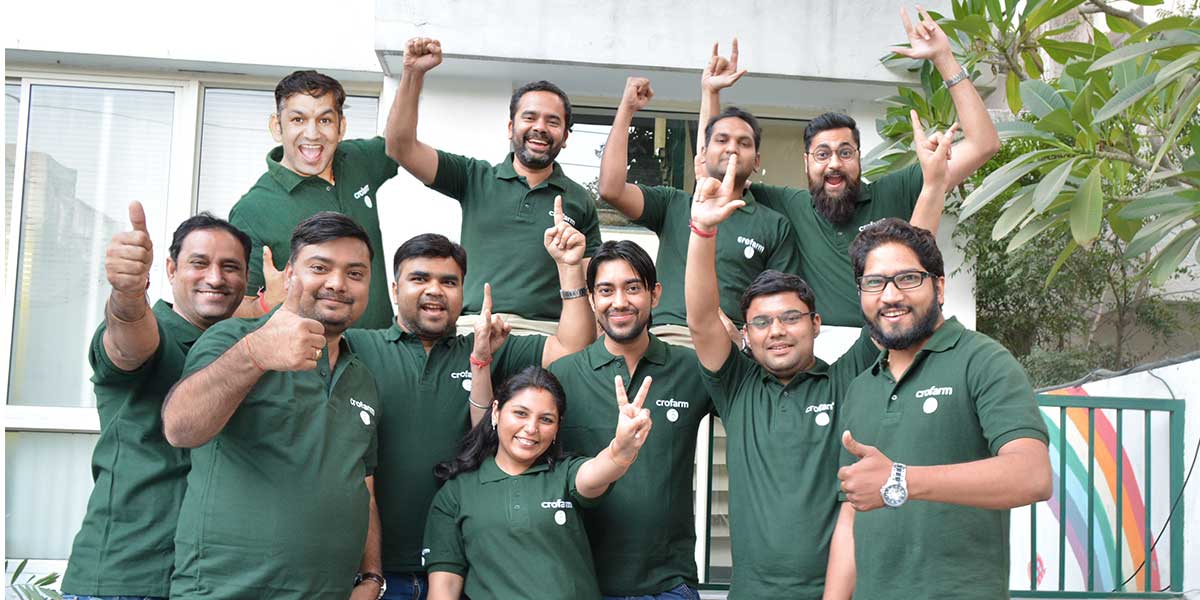Farmers are the fulcrum of the agriculture sector in India. But too often the absence of an efficient supply chain stands as a hurdle for farmers to get the right income for their produce and hard work.
The agriculture sector, which is largely unorganised in the country, accounts for 18 per cent of India’s gross domestic product (GDP) and provides employment to 50 per cent of the country’s workforce.
In the absence of transparency, more than 90 per cent of agricultural produce is traded by well-entrenched, multi-layer middlemen who take away a major chunk of farmers’ profit, leaving too little for them.
That is not all. The poor supply chain is a pain in the neck, causing post-harvest losses of 20 million metric tons annually in India.
India ranks 100 in the Global Hunger Index (GHI) — 2017 of 119 countries and has consistently ranked poorly. Millions of people in the country go to sleep on an empty stomach, the country wastes food worth Rs 58,000 crore in a year — about seven per cent of its total food production. It’s lost because of inefficiencies in production, processing, retailing and consumption.
The problem spurred Varun Khurana and Prashant Jain to incorporate Crofarm, to streamline the functioning of the unorganised agriculture sector and establish efficient trade relations between farmers, retailers, and consumers, in May 2016.
This is the duo’s second inning as entrepreneurs. They had also founded Greenbox, a smartphone-based grocery delivery platform in 2014, which was acquired by Grofers.
Following the acquisition, Khurana joined as the chief technical officer at the daily essentials delivery app while Jain was vice president of operations.
At Grofers, they had built the supply chain from the mandi to the consumer. Their deep dive into the supply chain for the Softbank-backed company attracted the duo’s attention towards hyper broken segment (farm to retail) as well as inefficient links between farmers and retailers (offline+offline).
After leaving Grofers, they spent time at farms across states including Haryana, Uttarakhand and Uttar Pradesh. The duo spent time in meeting vegetables and grain merchants to understand the existing inefficiencies in fresh produce supply chain.
“Crofarm enables farmers to make more money for their produce and retailers to get access to better quality produce at a better price,” says Varun Khurana, one of the co-founders of Crofarm. It aspires to offer better value to farmers, reduce wastage, help them drive sales and to ensure that businesses get the meaningful pricing.
Besides staple vegetables such as potatoes, onions, and tomatoes, it also covers fresh (green veggies) produce for brick & mortar and online retailers.
Crofarm is also planning to offer exotic vegetables such as broccoli, iceberg lettuce and red and yellow bell peppers soon. It claims to procure produce at fair prices directly from farmers for retailers such as Reliance Retail, Grofers, Big Basket, Big Bazaar, Metro and Food Works.

Since its inception, Crofarm is procuring from thousands of farmers and claims to serve over 100 retailers, out of 200 total retailers listed on the platform. “We move around 15-20 tonnes of produce every day,” adds Varun.
The total number of farmers on the platform is more than 10,000. At present, it has around 5,000 downloads on Google Play.
Challenges: Maintaining quality and handling perishable fresh produce
Maintaining quality of sourced fresh farm produce is a big challenge as it varies in shelf life. India is the second largest producer of vegetables and fruit but 25 per cent to 30 per cent of it gets wasted due to inadequate logistical support, lack of refrigerated storage and supply chain bottlenecks.
The Food and Agriculture Organisation (FAO) puts this figure at around 40 per cent — worth around $8.3 billion. Around Rs 50,000 crore of the food produced is wasted every year in the country.
“We have cold storage that we use to preserve most of our fruits. Leafy veggies like spinach, methi etc, are very sensitive to loss of moisture, as such it is important to keep their moisture levels intact to ensure maximum life. Commodities like potato and onion are easier as they have a high shelf life and don’t require lower temperatures to high moisture levels,” explains Varun.
The firm has built expertise and systems to handle perishable fresh produce to cut down on wastage, he emphasises.
Notably, Varun says that Crofarm doesn’t have essentially to stock produce for too long as it moves quickly without hiccups. The company has 125 plus Stock Keeping Units (SKUs) including wide range of fruits and vegetables.
Business Model and Revenue
Crofarm makes revenue through a commission on every sale it facilitates. It gets a commission ranging from around 15-20 per cent depending on the produce – more perishables items to less one.
Also read: How Ninjacart is solving supply chain woes for fresh fruits and vegetable segments
So far, the firm has raised Rs 15 crore investment including $1.5 million seed round from Pravega VC and a couple of angels including Rajan Anandan (MD, Google India) and Jitendra Gupta (MD, PayU India).
Six months ago, it raised Rs 5 crore ($783,000) pre-Series A round from Factor[e] Ventures and existing investors. We may raise another round as investment talks are going on, adds Varun.
During last fiscal, Crofarm posted a topline of $1 million (Rs 6.7 crore). “Our current run-rate is more than Rs 20 crore per year,” exclaims Varun.
At present, it’s primary office hub is in Delhi-NCR and plans to open regional offices to broaden its base in key geographies such as Hyderabad, Odisha and Jaipur. “We plan to expand beyond Delhi-NCR within this year,” adds Varun talking about plans for 2018.
The company also slated to start in-house packaging of the fresh produce soon. It has 50 people team that work across collection centers, distribution centres, and head office.
Over decades, the supply chain in agri space has been inefficient and anti-farmer. However, it’s slated to undergo huge change as tech-driven solutions like Crofarm and Ninjacart are solving the two-way headache for farmers and retailers.
Weeding out supply chain inefficiencies in fresh produce and staples segments are large and required. Besides both, FarMart, RML AgTech, BigHaat, Ravgo and Jayalaxmi Agrotech are some other players trying bridging existing gaps between farmers and retailers.
However, Crofarm sees none of them as competitors. “Our main competition is unorganised mandis,” concludes Varun.
Crofarm: Website













